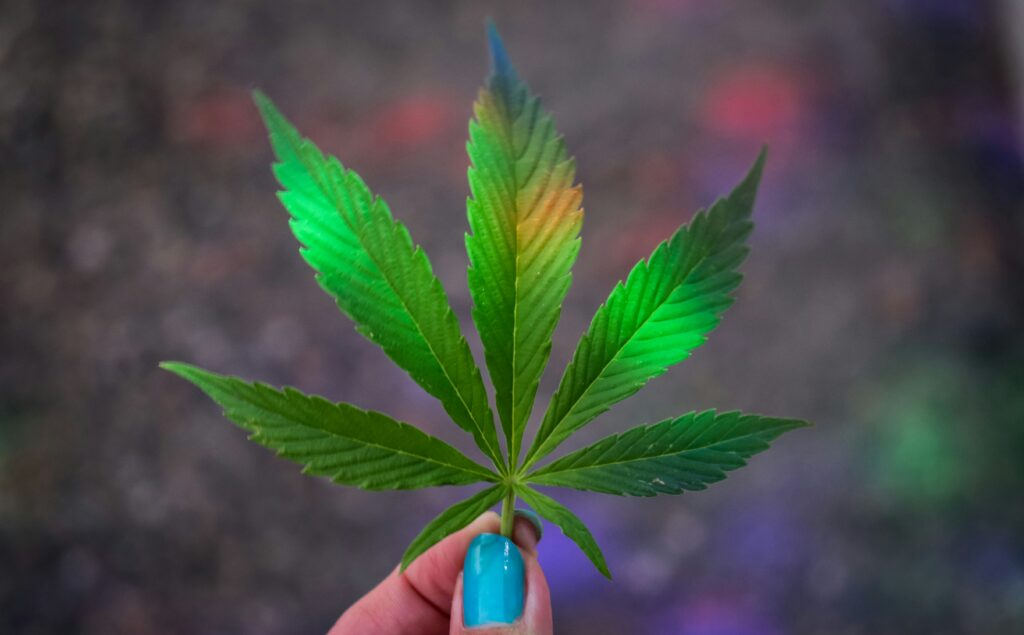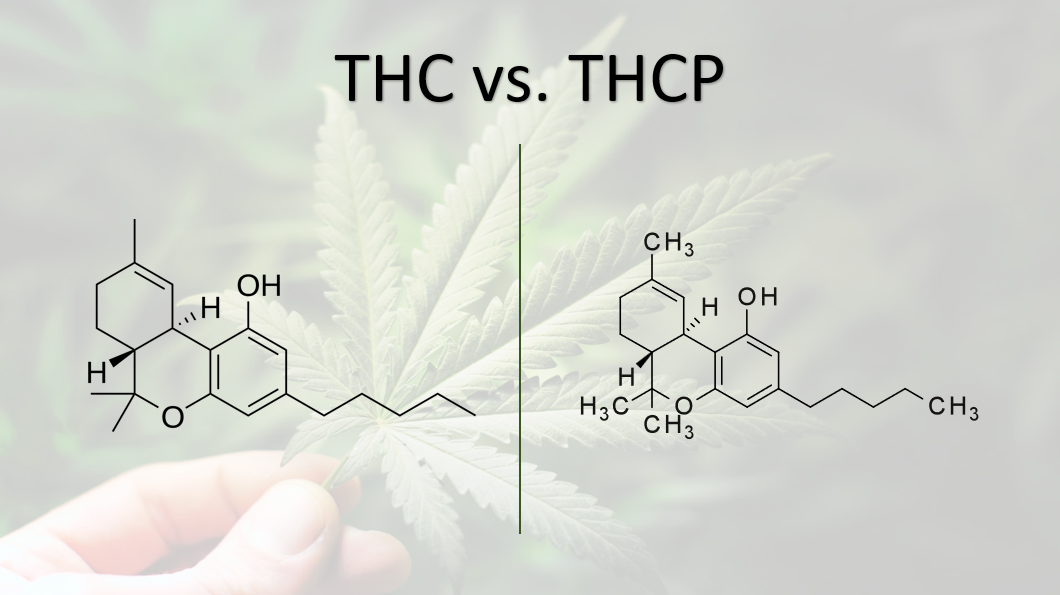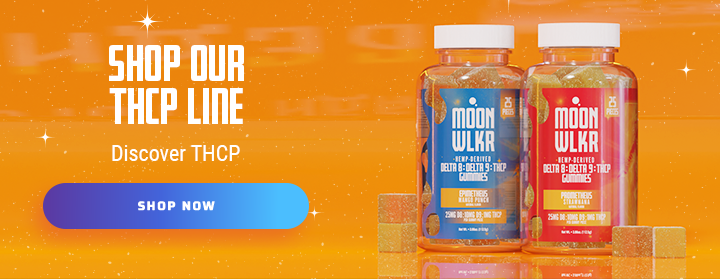The cannabis world is vast, with discoveries continually reshaping our understanding of its various compounds. THC (tetrahydrocannabinol) and THCP (tetrahydrocannabiphorol) are two cannabinoids that have sparked interest for their unique properties and effects – but a lot of questions remain about how THCP stands up against THC, what it’s effects are, and much more
In this blog, we’ll dive deeper into these compounds for a comprehensive comparison.

What is THC?
Tetrahydrocannabinol, commonly known as THC, is the most well-known psychoactive compound in cannabis. It’s responsible for the classic “high” that cannabis is known for, and its utilized for both its recreational and medicinal effects.
The Effects of THC
THC’s effects are multifaceted and can differ based on intended use, dosage, personal reaction to the substance, and more.
Recreationally, it’s used for its ability to produce euphoria and relaxation, and altered sensory perception.
Medically, it’s been found effective in easing chronic pain, stimulating appetite or reducing nausea in chemotherapy and AIDS patients, and aiding in sleep disorders like insomnia. For medical use, THC has been used in various forms, including oils, edibles, and prescriptions like dronabinol.
How to Dose THC: 4 Tips for Newbies
Dosing THC correctly is crucial for a safe and enjoyable experience, especially for those new to cannabis or returning after a long break. THC’s effects can vary greatly depending on the amount consumed, the consumer’s body chemistry, and the method of ingestion.
Here are four key tips to help you navigate THC dosing if you’re newer to it:
- Understand Potency: The potency of THC in a product is usually measured in milligrams (mg). For flower, it’s expressed as a percentage of THC in the product. Edibles, oils, gummies, and tinctures will typically have the THC content listed in milligrams. Understanding this measurement is key to dosing correctly.
- Start Low and Go Slow: For beginners or low-tolerance cannabis users, the mantra is to start with a low dose and go slow. This could mean starting with as little as 2mg-to-5mg of THC for edibles or a single puff for inhaled products. It’s crucial to wait and see how this affects you before consuming more.
- Wait for the Effects: Different methods of consuming THC have different onset times. Smoking or vaping can produce effects within minutes, while edibles can take anywhere from 30 minutes to two hours. Be patient and give the THC time to work before deciding to consume more.
- Consider Individual Factors: Factors such as body weight and metabolism can affect how THC impacts an individual. For instance, someone with a faster metabolism may process THC more quickly. Be mindful of these factors when determining your ideal dose.
What Does a THC High Feel Like?
Consuming THC can lead to a variety of experiences, influenced by the strain, dosage, and individual’s tolerance. Common effects include a sense of well-being, relaxation, heightened sensory perception (such as brighter colors and enhanced taste), laughter, and altered perception of time.
On the flip side, it can also cause dry mouth, red eyes, slowed reaction times, and in some cases, anxiety or paranoia.
Does THC Show Up on Drug Tests?
Yes. THC can stay in your system for up to 30 days. Your liver processes THC and turns it into metabolites over time, but this can take days or weeks depending on your individual body type, metabolism, and more. During the period when your body is processing the metabolites, they will show up in your urine (which is one of the most common ways drug tests are administered).
What is THCP?
Discovered in 2019, tetrahydrocannabiphorol (a.k.a. THCP) is a newer cannabinoid that’s similar to THC but with a longer alkyl side chain. This structural difference could significantly amplify its psychoactive potential.
Have you ever wondered how THCP is made? Click here to learn more.
Why is THCP Called the “Exotic” Cannabinoid?
The “exotic” label for THCP stems from its rarity and the recent nature of its discovery.
Unlike THC, which has been studied extensively, THCP is still under the scientific microscope. Its potential for stronger binding affinity with cannabinoid receptors suggests it could be more potent than THC, making it of particular interest to both the scientific community and cannabis enthusiasts.
What Does a THCP High Feel Like?
The experience of consuming THCP is presumed to be similar to THC but potentially more intense due to its greater binding affinity.
This means that even small amounts of THCP could produce significant psychoactive effects. Users may experience a deeper sense of euphoria, stronger sensory enhancements, and possibly more pronounced cognitive alterations – but given how rare THCP is and how much research we still need to do on it, there’s a lot to unpack here before we know for sure.
Wondering what the effects of THCP feel like? Click here to learn more.
Is THCP Stronger Than THC?
Current research suggests that THCP could be significantly more potent than THC. This is primarily due to its ability to bind more effectively to the brain’s cannabinoid receptors. However, more research is needed to fully understand the implications of this increased potency.
Does THCP Show Up on Drug Tests?
Regarding drug testing, most standard tests screen for THC metabolites. Since it’s so new and it’s a completely different compound, it’s unclear if it would be detected by these tests.
However, given the structural similarities, there is a possibility that THCP consumption could result in a positive drug test for THC.
Formats THCP Can Be Purchased In
Currently, THCP is available in limited formats compared to THC – for example, we offer THCP gummies.
As research and interest in this cannabinoid grow, it is likely to become more widely available in more diverse forms like oils, tinctures, vapes, and more.

Comparing THCP vs. THC
THCP and THC may seem like they have everything in common except one letter, but in this section we’ll dive into an in-depth comparison of the two compounds, unraveling their similarities and differences to provide a clearer understanding of these fascinating cannabinoids.
What Are the Differences Between THCP vs. THC?
The fundamental difference between THC and THCP lies in their molecular structure. THCP’s longer side chain potentially allows it to bind more effectively with CB1 receptors in the brain, which are responsible for the psychoactive effects of cannabinoids.
What Are the Similarities Between THCP vs. THC?
Both THC and THCP are psychoactive cannabinoids that interact with the body’s endocannabinoid system – a.k.a. the signaling system in the brain. This system plays a key role in regulating a range of functions and processes, including mood, memory, appetite, and pain sensation. Both compounds can have effects on these processes, although their intensity may vary due to the makeup of the compounds.
Are Both THC and THCP Legal?
The legality of THC and THCP varies significantly by U.S. state. THC is legal for either recreational or medicinal use in several states and countries, but remains illegal under federal law in the United States.
THCP’s legality is more ambiguous due to its recent discovery – it isn’t explicitly mentioned in most cannabis legislation. However, it’s safe(ish) to assume that where THC is legal, THCP may follow.
Risks of Using THCP and THC
The risks associated with THC include impaired motor skills, potential for anxiety and paranoia, and short-term (and potentially long-term) memory impairment. Given THCP’s higher potency, these risks could be amplified, leading to more intense side effects. Users should approach THCP with caution, especially those new to cannabis or with lower tolerance levels.
While THC is a well-known entity in the cannabis world, THCP emerges as its potentially more potent cousin. Its enhanced psychoactive potential and the mystery surrounding its effects make it a significant area for future research and exploration in the cannabis industry. As always, responsible use and adherence to local laws are crucial when experimenting with these compounds.
We’ve talked about the risks, learn more about the benefits of THCP.
Check out our THCP products to learn more about this intriguing, exotic compound.





